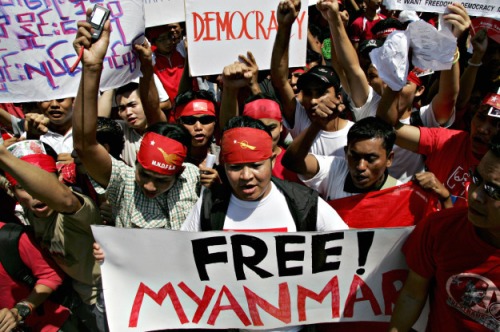I was reading a Foreign Policy blog post this morning when I came upon a startling fact: international issues are a priority for less than two out of ten Americans. More than eight out of ten, on the other hand, cited domestic policy as their number one voting issue.
The findings, from a Washington Post-ABC News poll, got me thinking: do Americans care about the world anymore? Have domestic hot button issues — underemployment, slow or negative job growth, immigration, gay rights, contraception and reproduction, Occupy YouNameIt — taken over the political main stage and left the burning issues of the international landscape — fraudulent Russian elections, the Syrian crackdown, European disintegration, the transition of the Libyan government, clashes in Somalia, the DRC, and Sudan, to name a few — high and dry? And maybe, dare I say it, could that be a good thing for the United States?


 Standardized testing has become a fact of life for students. To get accepted to Wes, we all took SATs and SAT IIs or ACTs and often AP tests or IB tests, not to mention an alphabet soup of state specific tests. Seniors preparing for further academic work are studying for or taking their GREs or LSATs or MCATs. These are not all that admissions offices look at – they are weighed alongside recommendations, grades, interviews, personal statements and more – but they provide one gauge of an applicant’s ability and readiness for school. After following the last few months of presidential primary season and attempting to prepare myself for the upcoming year of elections (yes, really, there’s another 11 months of this), I am increasingly of the opinion that we need to create another test, which I have provisionally named the PC GIT, or Presidential Candidate’s General Information Test.
Standardized testing has become a fact of life for students. To get accepted to Wes, we all took SATs and SAT IIs or ACTs and often AP tests or IB tests, not to mention an alphabet soup of state specific tests. Seniors preparing for further academic work are studying for or taking their GREs or LSATs or MCATs. These are not all that admissions offices look at – they are weighed alongside recommendations, grades, interviews, personal statements and more – but they provide one gauge of an applicant’s ability and readiness for school. After following the last few months of presidential primary season and attempting to prepare myself for the upcoming year of elections (yes, really, there’s another 11 months of this), I am increasingly of the opinion that we need to create another test, which I have provisionally named the PC GIT, or Presidential Candidate’s General Information Test.
 The annual U.N. climate talks, this year COP-17, began five days ago in Durban, South Africa. The major question this year is what we should do with the Kyoto Protocol, which is set to expire in 2012. John Prescott, former U.K. labor minister and one of the leading delegates at the Kyoto negotiations, is calling for the Durban delegates to
The annual U.N. climate talks, this year COP-17, began five days ago in Durban, South Africa. The major question this year is what we should do with the Kyoto Protocol, which is set to expire in 2012. John Prescott, former U.K. labor minister and one of the leading delegates at the Kyoto negotiations, is calling for the Durban delegates to 



